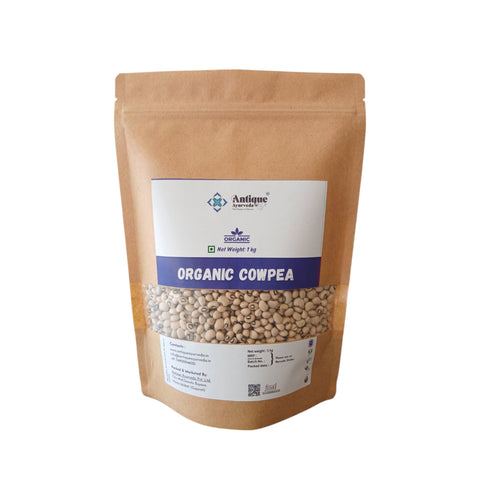
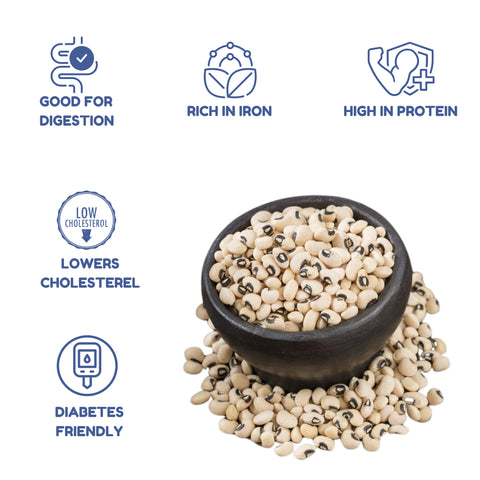
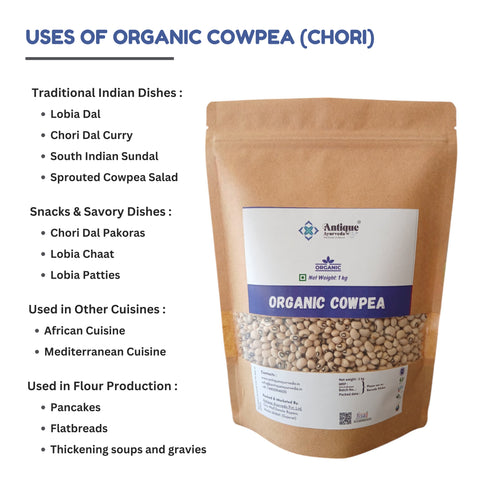
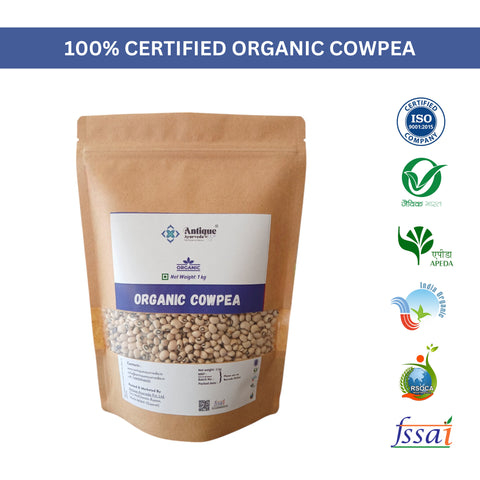
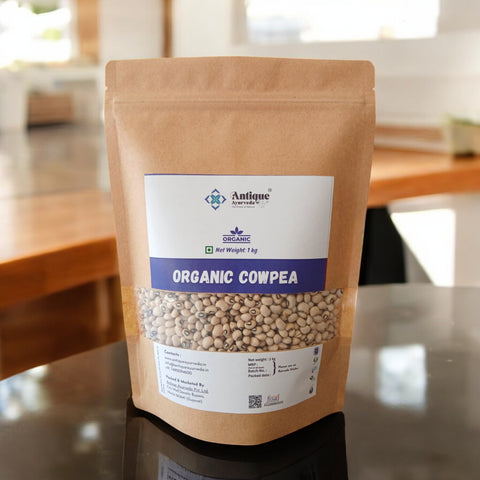
Organic Cowpea (Chawla/Chori) | Premium Black-Eyed Beans
Use this code to get 10% discount
Product Description
Organic Cowpea, known as Chawla in Hindi and Chori in Punjabi, are nutrient-dense legumes also called black-eyed peas due to their distinctive black spot. These cream-colored beans with a characteristic dark "eye" are drought-resistant crops that have sustained communities for centuries. Our organic cowpeas are cultivated without chemicals, preserving their natural nutritional profile and earthy flavor.
Ancient Survival Grain: Cowpeas represent one of humanity's most resilient food sources, having originated in Africa over 5,000 years ago and spread across continents as a survival crop. This remarkable legume thrives in harsh conditions where other crops fail, making it a cornerstone of food security in challenging climates worldwide.
Multi-Cultural Nutritional Bridge: Known by many names across cultures - black-eyed peas in America, Chawla in North India, Chori in Punjab, and Cowpea globally - this versatile legume unites diverse culinary traditions while providing consistent, high-quality plant protein and essential nutrients across all preparations.
Resilient Superfood Benefits
High Protein Content: 24g protein per 100g - excellent plant-based protein source
Rich in Fiber: 10g fiber per 100g supports digestive health and gut microbiome
Iron Powerhouse: Prevents anemia and supports oxygen transport throughout body
Folate Rich: Essential for pregnant women and DNA synthesis
Potassium Source: Supports heart health and blood pressure regulation
Low Glycemic Index: Helps manage blood sugar levels naturally
Antioxidant Properties: Contains flavonoids and phenolic compounds for cellular protection
Weight Management: High protein and fiber promote long-lasting satiety
Exceptional Nutritional Profile
Protein Excellence: 24g complete protein per 100g with balanced amino acid composition
Fiber Champion: 10g dietary fiber per 100g supporting digestive and metabolic health
Iron Rich: 8.3mg iron per 100g, excellent for anemia prevention
Folate Abundance: 633mcg folate per 100g, crucial for pregnancy and cellular function
Potassium Power: 1112mg potassium per 100g for heart health and blood pressure
Magnesium Source: 110mg magnesium per 100g for muscle and bone health
Low Glycemic Index: GI of 35-40, ideal for blood sugar management
Drought-Resistant Heritage & Sustainability
Climate Resilience: Thrives in arid conditions with minimal water requirements
Sustainable Agriculture: Fixes nitrogen in soil, improving fertility naturally
Drought Tolerance: Survives extreme weather conditions where other crops fail
Environmental Benefit: Requires 70% less water than traditional legumes
Soil Enhancement: Legume properties improve soil health for future crops
Carbon Sequestration: Contributes to carbon storage and climate mitigation
Food Security: Reliable nutrition source during challenging growing seasons
Multi-Regional Indian Identity
Chawla (Hindi): Popular across North India in traditional curries and preparations
Chori (Punjabi): Beloved in Punjab for hearty dal and vegetable combinations
Regional Variations: Different cooking styles across Indian states and cultures
Cultural Significance: Integral part of traditional festivals and celebrations
Local Adaptation: Varieties adapted to specific regional climate and taste preferences
Community Food: Staple protein source in rural and urban Indian households
Seasonal Importance: Essential nutrition during monsoon and winter seasons
Organic Excellence & Quality Assurance
100% Organic Certified: Chemical-free, pesticide-free cultivation methods
Premium Quality: Uniform size, minimal broken beans, consistent appearance
Fresh Harvest: Processed and packed for maximum nutritional retention
Traditional Seeds: Non-GMO, heritage varieties preserved through generations
Natural Farming: Sustainably grown in drought-resistant farming conditions
Quality Control: Rigorous testing for purity, freshness, and cooking quality
Traceability: Complete farm-to-table tracking ensuring authenticity
Health & Therapeutic Applications
Diabetes Management: Low GI (35-40) and high fiber help maintain stable blood sugar
Heart Health: High potassium and magnesium support cardiovascular wellness
Weight Management: High protein and fiber promote satiety and healthy metabolism
Anemia Prevention: Rich iron content boosts hemoglobin and energy levels
Pregnancy Nutrition: Exceptional folate content supports fetal development
Digestive Health: Fiber promotes beneficial gut bacteria and regular digestion
Muscle Building: Complete protein supports muscle growth and recovery
Diverse Indian Culinary Applications
Chawla Masala: Classic North Indian spiced curry with onions and tomatoes
Chori Dal: Punjabi-style lentil preparation with warming spices
Mixed Vegetable Curry: Combined with seasonal vegetables for complete nutrition
Stuffed Parathas: Protein-rich filling for traditional flatbreads
Sprouted Salad: Fresh sprouts with vegetables and tangy dressing
Regional Specialties: State-specific preparations across different Indian cuisines
Festival Foods: Special occasion dishes for religious and cultural celebrations
Perfect Cooking Guide
Soaking Method: Soak cowpeas for 6-8 hours or overnight for easier cooking
No-Soak Option: Can be cooked directly but requires longer cooking time
Water Ratio: Use 1:3 ratio (1 cup cowpeas to 3 cups water)
Pressure Cooking: Cook for 12-15 minutes or 4-5 whistles until tender
Traditional Method: Simmer for 45-60 minutes until beans are soft
Spice Integration: Add aromatic spices during cooking for enhanced flavor
Texture Check: Properly cooked cowpeas should be soft but hold their shape
Sprouting Excellence Guide
Sprouting Preparation: Soak cowpeas for 8-12 hours in clean water
Draining & Wrapping: Drain and wrap in damp cloth for sprouting
Sprouting Time: 24-48 hours in warm, dark place for optimal sprouts
Fresh Sprouts: Ready when sprouts are 1/2 to 1 inch long
Safety Cooking: Lightly cook sprouts before consumption for safety
Nutritional Boost: Sprouting increases vitamin C and enzyme content
Storage: Fresh sprouts keep in refrigerator for 2-3 days
Ayurvedic Properties & Benefits
Dosha Balance: Balances Vata and Pitta doshas naturally
Warming Energy: Provides sustained warmth and energy during cold seasons
Digestive Support: Easy to digest when properly prepared with spices
Strength Building: Supports physical strength and stamina development
Blood Purification: Traditional use for cleansing and purifying blood
Ojas Enhancement: Builds vital energy and supports overall immunity
Grounding Food: Provides stable, nourishing energy for daily activities
Storage & Quality Maintenance
Storage Guidelines: Store in cool, dry place in airtight containers
Eye Preservation: Protect distinctive black "eye" marking from fading
Shelf Life: 12-18 months when stored properly in optimal conditions
Quality Indicators: Fresh cowpeas have cream color with distinct black eye
Pest Prevention: Keep sealed to prevent insect infestation
Moisture Control: Protect from humidity to prevent sprouting in storage
Sprouting Storage: If sprouting, use sprouted beans within 24-48 hours
FAQ
A: 100% Organic Certified: Chemical-free, pesticide-free cultivation
Premium Quality: Uniform size, minimal broken beans
Fresh Harvest: Processed and packed for maximum nutritional retention
Drought-Resistant Variety: Sustainably grown in natural farming conditions
Traditional Seeds: Non-GMO, heritage varieties
Multi-Regional: Suitable for diverse Indian cooking styles
A: Popular dishes include Chawla Masala curry, Chori Dal, mixed vegetable curry, stuffed parathas, and sprouted chawla salad.
A: Yes, cowpeas have a low glycemic index and high fiber content, making them excellent for blood sugar management when part of a balanced diet.
A: They are all the same legume! Cowpea is the English name, while Chawla (Hindi) and Chori (Punjabi) are regional Indian names for the same black-eyed bean.
A: Cowpeas should be cooked before eating. However, they can be sprouted and then cooked lightly, or used in salads after proper sprouting process.
A: Cowpeas can thrive with minimal water, survive in arid conditions, and continue producing even during drought periods, making them crucial for food security in challenging climates.
